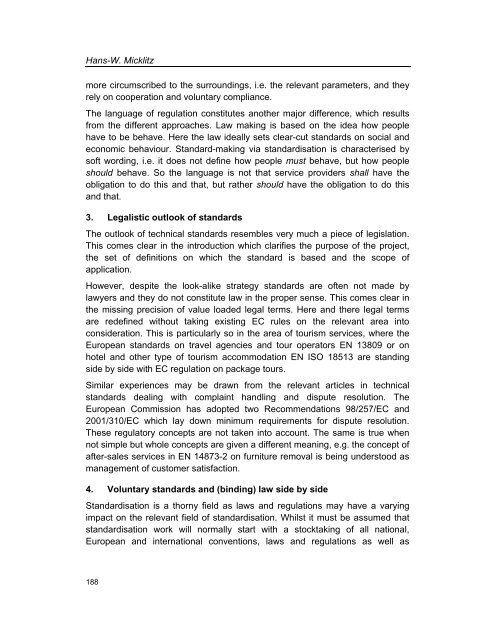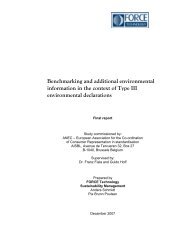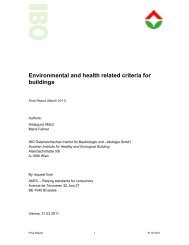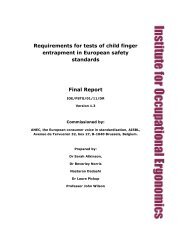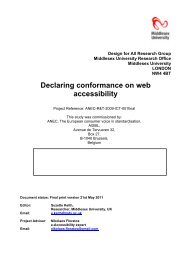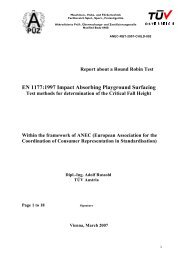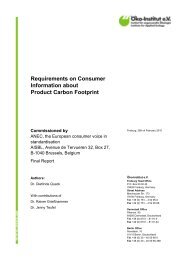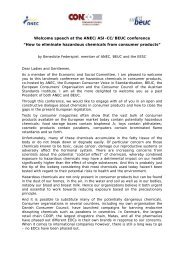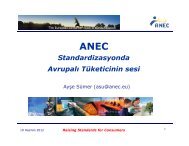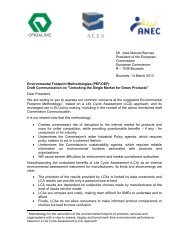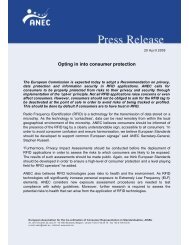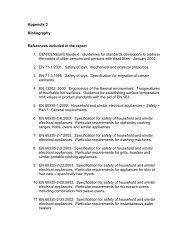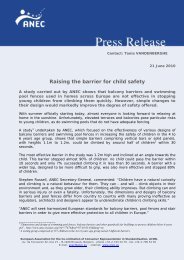Services Standards: Defining the Core Consumer Elements ... - ANEC
Services Standards: Defining the Core Consumer Elements ... - ANEC
Services Standards: Defining the Core Consumer Elements ... - ANEC
You also want an ePaper? Increase the reach of your titles
YUMPU automatically turns print PDFs into web optimized ePapers that Google loves.
Hans-W. Micklitz<br />
more circumscribed to <strong>the</strong> surroundings, i.e. <strong>the</strong> relevant parameters, and <strong>the</strong>y<br />
rely on cooperation and voluntary compliance.<br />
The language of regulation constitutes ano<strong>the</strong>r major difference, which results<br />
from <strong>the</strong> different approaches. Law making is based on <strong>the</strong> idea how people<br />
have to be behave. Here <strong>the</strong> law ideally sets clear-cut standards on social and<br />
economic behaviour. Standard-making via standardisation is characterised by<br />
soft wording, i.e. it does not define how people must behave, but how people<br />
should behave. So <strong>the</strong> language is not that service providers shall have <strong>the</strong><br />
obligation to do this and that, but ra<strong>the</strong>r should have <strong>the</strong> obligation to do this<br />
and that.<br />
3. Legalistic outlook of standards<br />
The outlook of technical standards resembles very much a piece of legislation.<br />
This comes clear in <strong>the</strong> introduction which clarifies <strong>the</strong> purpose of <strong>the</strong> project,<br />
<strong>the</strong> set of definitions on which <strong>the</strong> standard is based and <strong>the</strong> scope of<br />
application.<br />
However, despite <strong>the</strong> look-alike strategy standards are often not made by<br />
lawyers and <strong>the</strong>y do not constitute law in <strong>the</strong> proper sense. This comes clear in<br />
<strong>the</strong> missing precision of value loaded legal terms. Here and <strong>the</strong>re legal terms<br />
are redefined without taking existing EC rules on <strong>the</strong> relevant area into<br />
consideration. This is particularly so in <strong>the</strong> area of tourism services, where <strong>the</strong><br />
European standards on travel agencies and tour operators EN 13809 or on<br />
hotel and o<strong>the</strong>r type of tourism accommodation EN ISO 18513 are standing<br />
side by side with EC regulation on package tours.<br />
Similar experiences may be drawn from <strong>the</strong> relevant articles in technical<br />
standards dealing with complaint handling and dispute resolution. The<br />
European Commission has adopted two Recommendations 98/257/EC and<br />
2001/310/EC which lay down minimum requirements for dispute resolution.<br />
These regulatory concepts are not taken into account. The same is true when<br />
not simple but whole concepts are given a different meaning, e.g. <strong>the</strong> concept of<br />
after-sales services in EN 14873-2 on furniture removal is being understood as<br />
management of customer satisfaction.<br />
4. Voluntary standards and (binding) law side by side<br />
Standardisation is a thorny field as laws and regulations may have a varying<br />
impact on <strong>the</strong> relevant field of standardisation. Whilst it must be assumed that<br />
standardisation work will normally start with a stocktaking of all national,<br />
European and international conventions, laws and regulations as well as<br />
188


